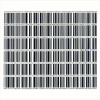 This is Ryoji Ikeda's first full-length release of new material since 2002's orchestral Op.,however, it is a return to his original form of rhythmic clicks, sonicbeeps, high pitched squeals, and low buzz. Although the claims comethat this, the first part of the Datamatics series, is built onstructures from data, Ikeda hasn't woven data into something that'sabstract or foreign sounding. The music is rather rhythmic,challenging, and completely enjoyable: something most computer musiciantypes have failed at.
This is Ryoji Ikeda's first full-length release of new material since 2002's orchestral Op.,however, it is a return to his original form of rhythmic clicks, sonicbeeps, high pitched squeals, and low buzz. Although the claims comethat this, the first part of the Datamatics series, is built onstructures from data, Ikeda hasn't woven data into something that'sabstract or foreign sounding. The music is rather rhythmic,challenging, and completely enjoyable: something most computer musiciantypes have failed at.Dataplex almost picks up where O°C left off, asthere's 20 tracks, a number of them are strung together using a commontheme, and for the most part, the music is very upbeat. The reason Ithink I like Ikeda's music over all the other sonic laptop "glitch"acts of the late 1990s is that Ikeda isn't glitch. His music is veryprecise and composed: it's never accidental, haphazard, or random.Ikeda's aesthetic is song-based. He knows how to start and end a songand make it something both tangible and enjoyable.
The first eight tracks are strung together: they follow the samehurried tempo and use a common palette. It's only by the ninth track,"data.microhelix," that things significantly change. This piece isdrastically slower and introduces some sustained lower tones into themix, making an almost funk-influenced groove that Ikeda's not commonlyknown to exhibit. When the pace picks up again for "data.superhelix,"the low tones remain but it's as if the sound has moved from being funkinspired to almost speed-metal inspired. Switching up the pace andpalette is in store for the following duo of tracks, "data.minimax" and"data.syntax," as the high pitched bell-like sounds clearly establishthat nobody else sounds like Ryoji Ikeda.
Ikeda returns to his new found love for incorporating other musicstyles in "data.flex" and its successor, "data.reflex," where both arealmost built through influences of deep techno, using lower tones likebass sounds and higher rhythmic sounds like a hi-hat. It's songs likethis that make me wonder what Ikeda might do as a member of atraditional rock group, adding his signature rhythmic clicks and beepson top of more standard western pop instrumentation. I'm sure somemight feel it would spoil the purity of the music but crossing soundscan prove quite influential to the evolution of music if they're wellexecuted.
Ikeda goes more abstract for the next triptych, "data.convex,""data.vertex," and "data.vortex," almost borrowing ideas from the wholemath-rock/post-rock/dub hybrid aesthetic, using dub-like echoes almostlike submarine sounds before cutting the beat and dousing the audiofloor with a low drone. It's serene and unusually peaceful.
Dataplex concludes with the cadence of the fantastic"data.matrix" (before the clearly abstract data noise of the disc'scloser, "data.adaplex") in a similar way that he has closed otherprojects, taking some of the ideas put forth in earlier tracks andwrapping them up in an all-encompassing song. Ikeda might claim thathis music is built from data points of DNA, the cosmos, or mathematics,but it's what's at the center his own heart that weaves everything intosuch elegant and beautiful songs.
samples:
Read More

